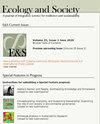Conceptualizing trust and distrust as alternative stable states: lessons from the Flint Water Crisis
IF 3.2
2区 社会学
Q1 ECOLOGY
引用次数: 1
Abstract
Despite the universally recognized importance of fostering trust and avoiding distrust in governance relationships, there remains considerable debate on core questions like the relation between (dis)trust and the evaluations of the characteristics that make a governance agent appear (un)worthy of trust. In particular, it remains unclear whether levels of (dis)trust simply follow levels of (dis)trustworthiness—such that building trust is primarily a question of increasing evidence of trustworthiness and avoiding evidence of distrustworthiness, or if their dynamics are more complicated. The current paper adds novel theory for thinking about the management of trust and distrust in the governance context through the application of principles borrowed from resilience theory. Specifically, we argue that trust and distrust exist as distinct, self-reinforcing (i.e., stable) states separated by a threshold. We then theorize as to the nature of the self-reinforcing processes and use qualitative data collected from and inductively coded in collaboration with Flint residents as part of a participatory process to look for evidence of our argument in a well-documented governance failure. We conclude by explaining how this novel perspective allows for clearer insight into the experience of this and other communities and speculate as to how it may help to better position governance actors to respond to future crises.将信任和不信任概念化为可选择的稳定状态:弗林特水危机的教训
尽管在治理关系中培养信任和避免不信任的重要性得到普遍认可,但在核心问题上仍然存在相当大的争论,例如(不信任)与使治理代理看起来(不)值得信任的特征的评估之间的关系。特别是,目前尚不清楚(不信任)的水平是否只是遵循(不信任)的水平——这样,建立信任主要是一个增加可信证据和避免不可信证据的问题,或者它们的动态更复杂。本文通过运用弹性理论的原则,为治理背景下的信任和不信任管理提供了新的思路。具体来说,我们认为信任和不信任存在于由阈值分隔的不同的、自我强化的(即稳定的)状态。然后,我们将自我强化过程的本质理论化,并使用从弗林特居民那里收集的定性数据和归纳编码,作为参与过程的一部分,在一个有充分记录的治理失败中寻找我们论点的证据。最后,我们解释了这种新颖的视角如何能够更清晰地洞察这个社区和其他社区的经验,并推测它如何有助于更好地定位治理参与者以应对未来的危机。
本文章由计算机程序翻译,如有差异,请以英文原文为准。
求助全文
约1分钟内获得全文
求助全文
来源期刊

Ecology and Society
环境科学-生态学
CiteScore
6.20
自引率
4.90%
发文量
109
审稿时长
3 months
期刊介绍:
Ecology and Society is an electronic, peer-reviewed, multi-disciplinary journal devoted to the rapid dissemination of current research. Manuscript submission, peer review, and publication are all handled on the Internet. Software developed for the journal automates all clerical steps during peer review, facilitates a double-blind peer review process, and allows authors and editors to follow the progress of peer review on the Internet. As articles are accepted, they are published in an "Issue in Progress." At four month intervals the Issue-in-Progress is declared a New Issue, and subscribers receive the Table of Contents of the issue via email. Our turn-around time (submission to publication) averages around 350 days.
We encourage publication of special features. Special features are comprised of a set of manuscripts that address a single theme, and include an introductory and summary manuscript. The individual contributions are published in regular issues, and the special feature manuscripts are linked through a table of contents and announced on the journal''s main page.
The journal seeks papers that are novel, integrative and written in a way that is accessible to a wide audience that includes an array of disciplines from the natural sciences, social sciences, and the humanities concerned with the relationship between society and the life-supporting ecosystems on which human wellbeing ultimately depends.
 求助内容:
求助内容: 应助结果提醒方式:
应助结果提醒方式:


